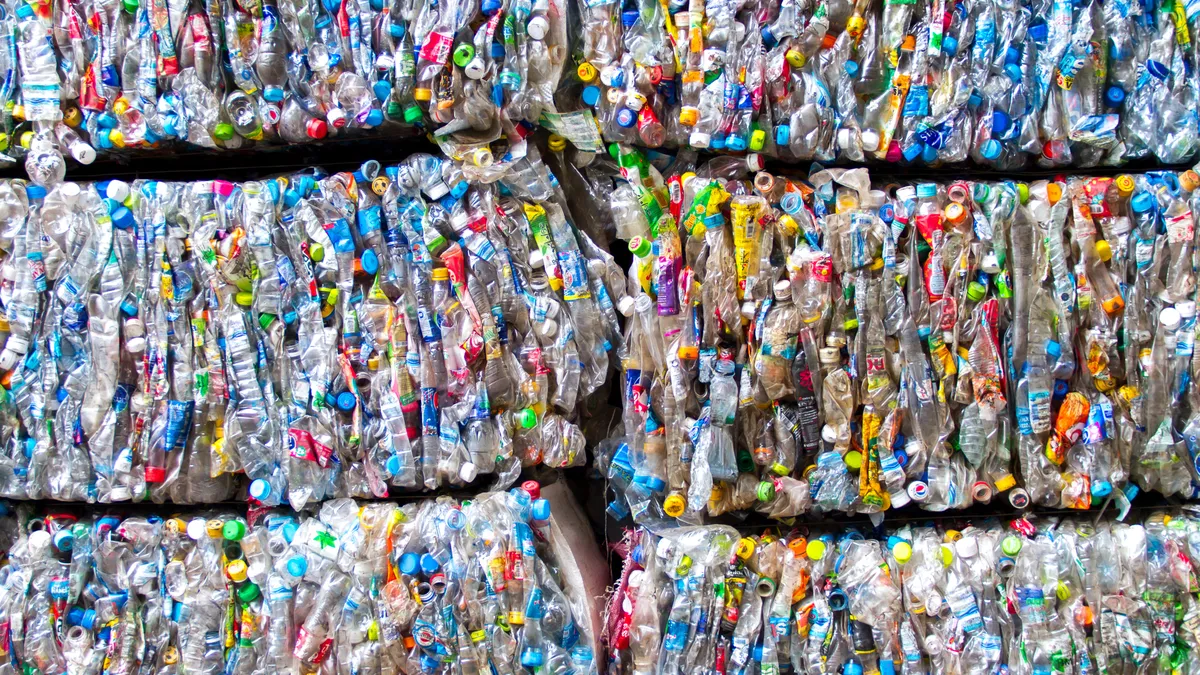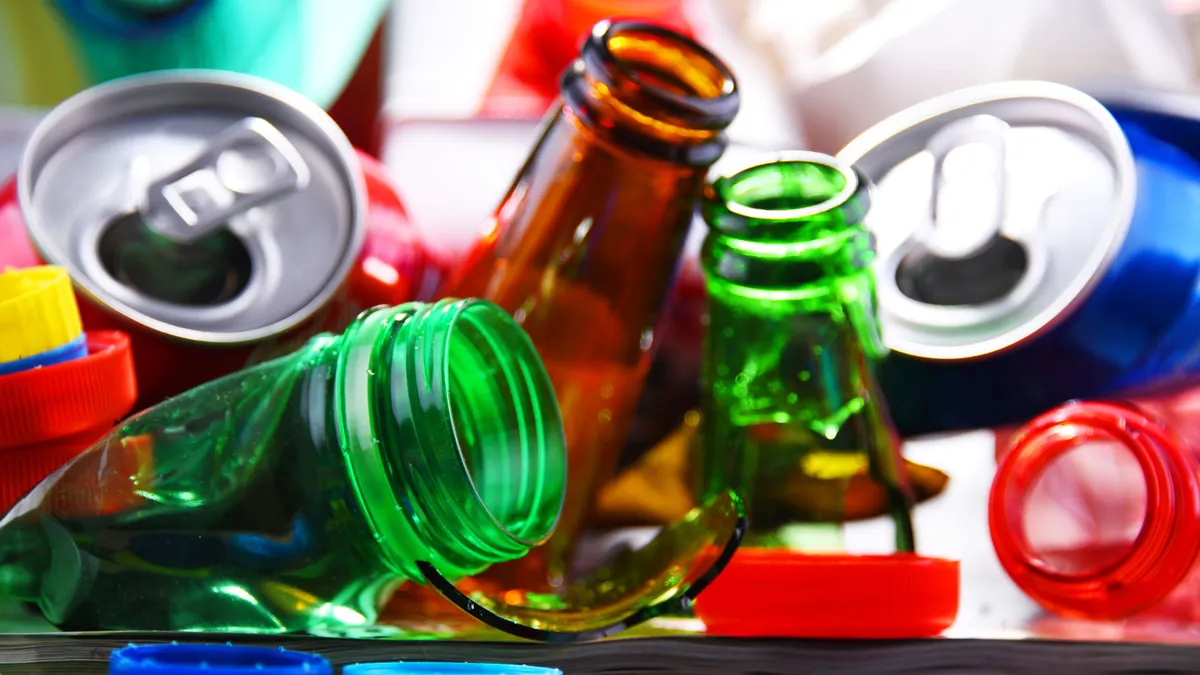Local environmental groups and grassroots organizing have long been a major driver of zero waste and environmental justice efforts in the United States. Just Zero, a new nonprofit, aims to support these local and regional projects with national-level resources.
The organization is new on the zero waste scene, but the advocates aren’t. Most of Just Zero’s staff come from the Massachusetts-based Conservation Law Foundation, where Just Zero founder and Executive Director Kirstie Pecci most recently led its Zero Waste Project in New England. Additional CLF zero waste project members Peter Blair, Kevin Budris, Lauren Fernandez and Olivia Synoracki have also joined Just Zero.
Just Zero hopes to work alongside community-focused groups, activists and local policymakers to offer resources such as scientific consulting, bill drafting and connections to a network of experts. Pecci recently talked with Waste Dive about Just Zero’s vision to tackle four main zero waste concepts: improving recycling, promoting composting, ending incineration and closing landfills.
This interview has been edited for length and clarity.
WASTE DIVE: In your time at CLF and other environmental organizations, you worked with many other environmental groups. What’s the aim of starting a new zero waste organization today, and what niche do you think Just Zero will fill?
KIRSTIE PECCI: It’s really a pretty big niche. When we were at CLF, we worked on the Zero Waste Project, but we did that just for New England. There's not really a nonprofit that does what I would call soup-to-nuts zero waste work across the United States.
There are lots of great groups across the country that do different pieces of the work. GAIA does really excellent anti-incineration work. Zero Waste USA does a lot of fantastic municipal planning work. The Institute for Local Self-Reliance does a lot of work on composting in Maryland. However, nobody does this work with [a national lens.] We wondered, what's the best way to take the expertise that we have and leverage as much as possible to make as much change as possible as quickly as possible? Our environment is in crisis, the climate is in crisis. Our trash system is incredibly wasteful. It makes sense to move forward and create a zero waste organization that could work across the U.S., not just in New England.
How do you translate zero waste work from a regional approach to a national one, and what does that look like when so many programs operate on a local level due to grassroots organizing and familiarity with local issues?
In the jump from regional to national work there are some pieces that a lot of folks don't want to do, like legislative drafting. I'll sit in a coalition meeting and everyone will say, “Okay, who is going to draft the bill?” And it always comes back to the lawyer, even though we don't really learn how to draft bills at law school. The team we've put together does a lot of bill drafting, so that's one piece we can be helpful with.
We've worked with so many folks at all these different fantastic organizations to learn what's worked in different states and what hasn’t, and they have a lot of the answers to those questions like, “What does a good deposit return system bill look like?” or “What does a good bottle bill look like? What's a good food waste diversion bill?” Those are some big principles that we can share, and we've drafted those bills and we're going to be putting them on our website so that folks can use those bills no matter what state they're in.
We are not on the ground. We are not grassroots organizers. We don't think that you can succeed in passing bills or creating good clean composting systems or circular recycling systems unless you have a grassroots presence. We also don't think you can shut down polluting landfills and incinerators without a grassroots drive. So we want to be a resource to any of those folks engaged in these campaigns and be able to support those folks who are trying to shut down the incinerator or landfill near them, who are trying to get a good composting law passed or create a good composting system in their city.
I got into this work because in the next town over from me there was a large landfill that was owned by the city that was being run by Casella, taking 450,000 tons a year. Back then, I was a grassroots campaigner in my own community and was working so hard to shut this place down. Today, I want to be able to help out a person like Kirstie from 2008. You can't get this done unless that grassroots presence exists, but it takes a long time and a lot of work to learn about the policy and who the players are in the space. If we can help with that, that’s what we want.
There are a lot of issues to tackle in the zero waste space. What will Just Zero’s focus be?
We have four programs. One is to keep compost clean. I don't think there is a composting group that works on this [on a national level] trying to support local composting efforts across the country. We want to make sure that food scraps are not mixed with sewage sludge or paper sludge or other toxic materials. And also we want to make sure if depackagers are used that we're minimizing it as much as possible because there's a lot of plastic left over in the food waste.
We also want to end burning. That means not only shutting down incinerators like our friends at GAIA have been doing, as well as other great groups across the country, but also stop ACC’s deregulation of plastic burning. There are now about 20 states that have [reclassified chemical recycling as a manufacturing process rather than a form of solid waste management]. We also want to make sure that loopholes for burning don't appear in other kinds of zero waste regulations and laws. Well-meaning folks are pushing forward bills that would allow materials in an extended producer responsibility bill, for instance, to just be burnt.
Our Reduce, Reuse, Recycle Right program is about pushing for zero waste policies, more specifically EPR for packaging bills, but also [passing and updating bottle bills]. We need to stop dragging our feet on that and stop letting American Beverage determine how we move forward in the [container return systems] world.
Then we talk about ‘recycling right.’ A lot of materials might be in a curbside bin, but they're not getting recycled. We need to look very critically at elements like glass. If it's going to be curbside, it should be separated from paper and cardboard. Our textiles — are they actually getting recycled? We need to make sure that we have good textile collection systems. Massachusetts is banning textiles from disposal this fall, which is fantastic, but we need to track where those textiles are going and make sure that they actually are reused and recycled.
Our last program is to stop burying trash and shut down landfills. We've let the waste companies create the narrative of “we need capacity to bury or burn waste.” The reality is that we need to create systems that require reduction and reuse, and we need to enforce laws and also tweak curbside and other systems so they actually work. In Massachusetts, 40% of what goes into our landfills and incinerators — not counting food waste at all, just recyclables — are banned items including textiles or mattresses that are not supposed to be disposed of, but it just hasn't been enforced.
Just Zero’s website mentions environmental justice as a driving principle. Where does that fit into these efforts?
We do all four of our programs through a justice lens: just, equitable, diverse and inclusive. We need to make sure that folks understand that those landfills and incinerators and other facilities are always predominantly located in communities of color, in impoverished communities, in places where English is not the primary language. We need to make sure we are working with the people who have suffered the most and have been treated the most unfairly.
Not only are we seeing that large and dangerous polluting facilities are being located in environmental justice communities, but we're also seeing that this system is getting larger and larger as materials are being shipped across state lines. So we're not just seeing environmental justice communities desperately impacted, we're seeing environmental justice states. Almost half of the waste buried and burned in New Hampshire is from out of state because New Hampshire doesn't have as high land values or as much money as Massachusetts. That's really troubling. As states shut down incinerators and landfills in their own state because they're realizing the dangers, they are still shipping these materials to Pennsylvania or Ohio or Florida.
We've created this organization understanding that the problem has gotten even more extreme, even more unjust and unfair. Zero waste programs can really impact our climate. If we can do work we love with people we love, even though this work is hard, we want to avoid burnout and help others avoid burnout. That way, you're going to be able to keep doing it for a long time and really make a big impact.


















